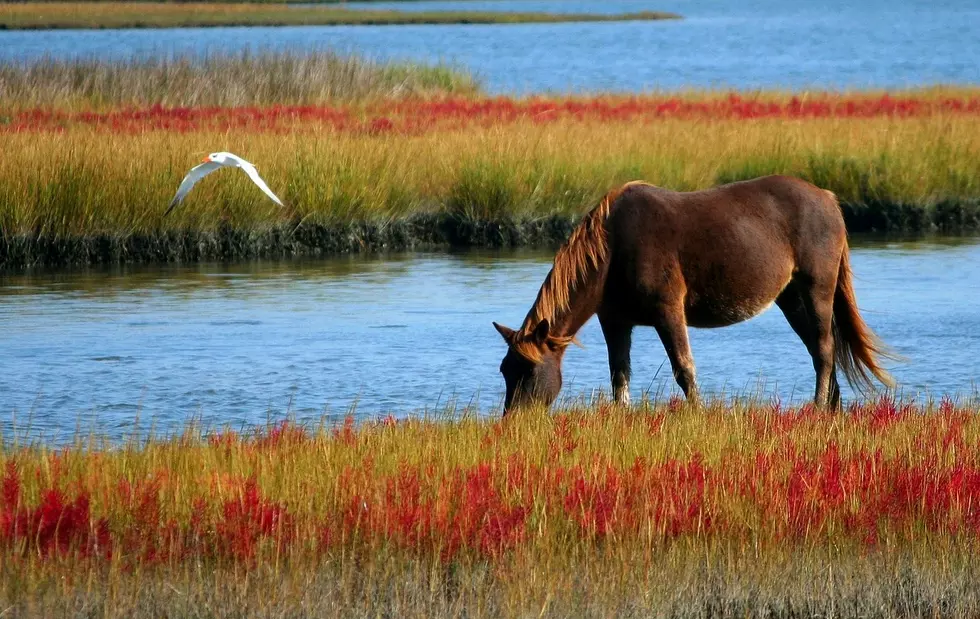
Advocates ask judge to halt sale of horses captured by feds
Michael McDaniel/Courthouse News
PHOENIX (CN) — Attorneys for the International Society for the Protection of Mustangs and Burros argued in federal court Friday that 18 horses seized by the U.S. Forest Service should be moved to a national forest, not sold to free market buyers or, potentially, slaughterers.
Troy Froderman of FR Law Group, representing the International Society for the Protection of Mustangs and Burros, argued that the evidence suggests the horses have lived in the Apache Sitgreaves National Forests for decades and that they are wild, free-roaming horses entitled to protection by the Wild Free-Roaming Horses and Burros Act of 1971.
Froderman showed the court a snippet of a newspaper, submitted as evidence, that describes a resident viewing “wild horses” in the region. He claimed the defense lacks similar historical evidence.
“We’re the only ones who presented evidence of an eyewitness who said in 1918 he saw the wild horses,” Froderman said.
Hannah O’Keefe and Taylor Marshall, representing the U.S. Forest Service, argued that the horses and other livestock threaten the habitats of a few endangered species in the region. Chiefly threatened is a mouse that the Center for Biological Diversity deems threatened due to habitat trampling, according to the nonprofit’s amicus brief.
“[Feral] horses and trespass cows have caused significant degradation of the critical habitat for the endangered New Mexico meadow jumping mouse,” wrote the biodiversity group in its amicus brief. “The feral horses and cows initially invaded the jumping mouse’s critical habitat en masse after the 2011 Wallow Fire destroyed the boundary fence between the White Mountain Apache Reservation and the Apache-Sitgreaves National Forest.”
Froderman argued that the government failed to adequately determine, through studies or due diligence, that the horses commandeered were not protected wild horses. The burden of proof, in this case, returns to the animals’ captors.
“If the Forest Service is going to remove them as unauthorized livestock, they have to demonstrate that these are not wild horses,” he said.
According to Froderman, the agency only studied a fiftieth of the Apache Sitgreaves National Forests in its statistical analysis. He said this is where the Apache horses were studied in determining the removal qualifications.
O’Keefe claimed the Forest Service used a “categorical exclusion” via the National Environmental Protection Act [NEPA] that allows them to preserve and protect public health and safety.
“These horses are harming the habitats of species protected by the Endangered Species Act,” she said, adding they are “also causing harm to themselves because the population growth is causing them to outgrow the ability of the lands.”
The horse advocates also contend the horses may be sold to locations where slaughter is legal.
According to expert witness Ericka Luna, Deputy Forest Supervisor for the Apache Sitgreaves National Forests, the U.S. Forest Service is doing its best to prevent butchers from taking the animals.
“We’re doing our best possible job to make sure that we are preventing animals from getting into the slaughter pipeline while also meeting our regulatory obligation for removal of unauthorized livestock,” Luna said.
In cross-examination, Froderman honed in on her clinical verbiage.
“You’ve made a point, during your answers with the judge, to keep referring to these horses as ‘unauthorized livestock,’” Froderman said. “The horse is at issue here.”
Luna was brought to the stand as a surprise witness when U.S. District Court Judge Steven Logan asked the government’s attorneys whether this was an issue of overpopulation or incompatibility.
The attorneys balked at answering, which led to Logan volunteering the gallery’s experts.
“Talk to your agency representatives out there that have badges, that’re shaking their heads, yes,” he said.
The attorneys for the Forest Service later conceded it was an overpopulation issue.
In closing arguments, O’Keefe said the plaintiffs had ample notice to act, referencing an impoundment notice issued in December 2021. Additionally, in March 2022, the Forest Service put a special message in newspapers. The brought their initial complaint this June.
According to her, this delay shows the advocates are not about to suffer irreparable harm.
Logan said he would take the matter under advisement and rule in due course.
